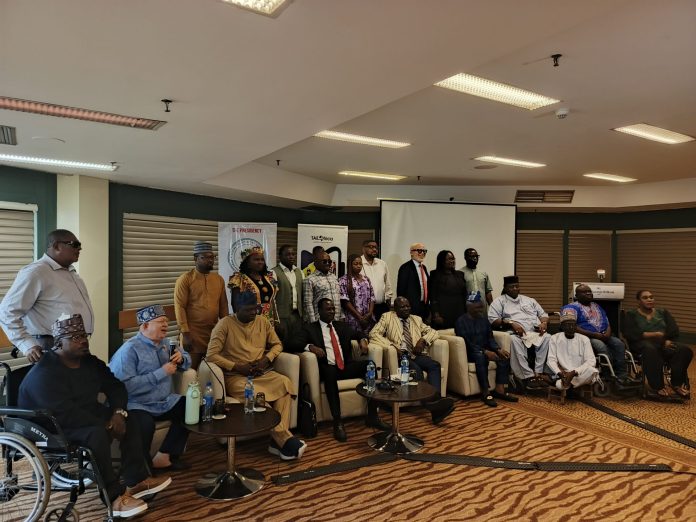Push for Tax Exemptions and Incentives Gains Momentum in Abuja
Abuja, Nigeria – February 26, 2025
In a renewed call for economic fairness and social inclusion, the Minister of Humanitarian Affairs and Poverty Reduction, Professor Nentawe Yilwatda, has urged the Nigerian government to implement a more inclusive tax policy that provides financial relief and incentives for Persons With Disabilities (PWDs).
Speaking at an Inclusive Tax Reform Town Hall Meeting in Abuja on Tuesday, Yilwatda stressed the urgent need for targeted tax measures to alleviate the economic hardships faced by PWDs. The high-profile event was organized by All-Rights Foundation Africa with funding from the European Union’s Support for Democratic Governance in Nigeria (EU-SDGN) programme.
The minister’s remarks reignited the conversation on economic justice for PWDs, as he outlined key proposals for tax exemptions, corporate incentives, and the establishment of a National Disability Fund—all aimed at fostering greater financial stability and inclusion for millions of Nigerians living with disabilities.
Proposed Tax Relief Measures: Easing the Financial Burden on PWDs
A core part of Yilwatda’s recommendations centered on tax exemptions and reductions on disability-related expenses, including medical care, assistive technologies, and mobility aids. He argued that Nigeria’s tax policies must reflect the unique financial challenges that PWDs face daily.
“We need tax relief measures that directly benefit persons with disabilities,” he emphasized. “This includes reduced VAT on assistive technologies, tax rebates on accessibility modifications, and corporate incentives for businesses that employ PWDs.”
According to the minister, the high costs of assistive devices, mobility aids, and specialized healthcare have left many PWDs struggling financially. These expenses, he noted, make daily survival even more difficult, forcing many into economic hardship.
“PWDs face significant financial challenges, and these expenses make daily life even more difficult,” he stated. “We must ensure that disability-related costs are recognized in tax policies to ease the financial burden on this vulnerable group.”
To further support PWDs, Yilwatda proposed that a portion of the national tax revenue be allocated to a National Disability Fund, which would finance social protection programmes and enhance access to essential services.
Inclusive Employment: Tax Incentives for Businesses That Hire PWDs
Beyond direct tax relief, Yilwatda’s proposal included strategic tax incentives to promote inclusive employment. He suggested that businesses that employ a certain percentage of PWDs should receive tax breaks, exemptions, or credits, creating a financial motivation for companies to prioritize inclusive hiring.
“This will create more job opportunities for PWDs and promote economic empowerment,” he stated, emphasizing the need for corporate accountability in disability inclusion.
He further proposed VAT reductions on disability-related products and services, arguing that lowering taxes on wheelchairs, hearing aids, prosthetics, and other assistive devices would enhance accessibility and improve the quality of life for PWDs.
“When we reduce taxes on essential disability-related products, we make these resources more affordable and accessible,” he added.
Support from Key Stakeholders: A National Movement for Change
Yilwatda’s proposals received strong backing from key stakeholders, including government officials, lawmakers, and civil society leaders, all of whom acknowledged the urgent need for tax reforms that prioritize PWDs.
Hon. Bashiru Dawodu, Chairman of the House Committee on Disability Matters, described tax reforms as a crucial step toward strengthening social protection for PWDs. He proposed the establishment of a Vulnerable Trust Fund to provide sustainable financial support for those facing economic difficulties.
“Tax reforms must reflect the realities of PWDs,” Dawodu said. “If we want an inclusive society, we must make financial policies that uplift those who need them the most.”
Taiwo Oyedele, Chairman of the Presidential Committee on Fiscal Policy and Tax Reforms, reiterated the government’s commitment to creating a fair and inclusive tax system. He assured that the ongoing tax reform agenda would prioritize reducing economic barriers for PWDs.
“The ongoing tax reforms are designed to reduce economic barriers and ensure PWDs are supported in their economic participation,” Oyedele stated.
Jake Epelle, CEO of All-Rights Foundation Africa, also commended the initiative, urging the government to involve PWDs in the policymaking process to ensure that reforms reflect their lived experiences.
“True inclusion begins when policies are designed with direct input from those affected,” he emphasized. “We must make sure that government programmes and policies are fully accessible to PWDs.”
Looking Ahead: Can Nigeria Lead in Disability-Inclusive Tax Reforms?
The growing advocacy for inclusive tax policies signals a potential turning point for disability rights in Nigeria. If adopted, these proposed reforms could pave the way for greater economic opportunities, social inclusion, and financial relief for millions of PWDs across the country.
However, the real test will be whether the government moves beyond proposals and takes concrete legislative and executive actions to implement these changes. With an estimated 35 million Nigerians living with disabilities, the stakes are high, and expectations are even higher.
As the Nigerian government continues its tax reform agenda, all eyes will be on policymakers to ensure that this moment leads to real, lasting change for PWDs—not just another round of empty promises.


